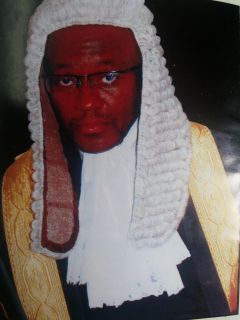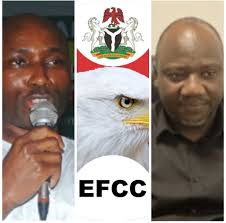Dr. Henry Mobolaji Akinduro, Chairman/CEO of Global Signature Hotel and Total Grace Group Limited, has filed a N5 billion lawsuit against the Economic and Financial Crimes Commission (EFCC) for allegedly declaring him wanted unlawfully.
In the suit filed on Wednesday at the Federal High Court, Lagos, Akinduro submitted that the EFCC declared him wanted without any form of judicial intervention, recourse to constitutional safeguards or order of court.
The EFCC on Friday, 11 October, 2024 at about 7.20pm on its official twitter handle, also known as ‘X’ declared the oil magnate ‘Wanted’. The businessman is praying the court to order the EFCC to remove his name from the wanted list published on the commission’s official website or any other related platform including Twitter (X).
Akinduro is seeking N5 billion as “general damages”.
On Monday 14 October, 2024, the businessman, via his counsel, Olalekan Ojo SAN had petitioned the Executive Chairman of the EFCC over the unconstitutional violation of his fundamental human rights to personal liberty and human dignity by the publication of his name on the list of wanted persons on the EFCC’s website.
Ojo averred in the petition that at all times preceding the said publication there was no order of any Court of competent jurisdiction authorizing the said publication and no charge had been preferred against our Client before any Court of law.
According to Akinduro’s Lawyer, the Commission had allegedly made the said illegal or unlawful publication declaring him wanted upon the prompting or instigation of one Mr. Femi Olushakin who had earlier written a petition against the oil magnate in respect of a N240 million contractual dispute between them —Messrs Olushakin and Akinduro.
He affirmed that disputes had arisen from the investment agreement entered into between the two men leading to Olushakin petitioning EFCC.
“Our Client (Akinduro) was invited by the Commission on 4th June, 2024 and he immediately responded via letter dated 5th June, 2024 notifying the Commission of his unavailability due to medical reasons. In the said letter, it was stated therein that our Client was out of the Country receiving medical attention. He subsequently provided assurances that he would be present at the Commission as soon as he was medically cleared to travel. It is pertinent at this juncture to chronicle the genesis of the subject matter which led to the declaration of our Client Wanted by the Commission,” Ojo stated.
The Counsel disclosed that there was a business transaction between Akinduro and Olushakin which was backed by a viable collateral which included Akinduro’s Global Signature Hotel worth N500 million, three (3) 60-Seater Yutong buses valued at over N240 million and a Toyota 4Runner SUV.
Ojo claimed that Olushakin has sold the three 60-Seater Yutong buses and currently drives around the city in the Toyota 4Runner SUV which were used as collateral by Akinduro.
“It is clear from the above that this is a purely civil business transaction with no element of criminality embedded in it. Mr. Femi Olushakin maliciously petitioned the Commission after selling the 60-Seater Yutong buses and currently using the Toyota 4runner SUV for his personal use,” he stated.
The Senior Lawyer added that despite Akinduro’s medical condition overseas, he has maintained close communication with the Commission.
“Our Client regularly sends his Legal Officer to the Commission, affirming his willingness and desire to appear before the Commission upon due confirmation of his being fit to travel by his doctors. There was no further request by the Commission inviting our Client before the unlawful publication.
“It is to be further noted that on 11 October, 2024, our Client’s Legal Officer was physically present at the office of the Commission around noon to submit a correspondence to the Commission and he also reassured the Operatives of the Commission of our Client’s desire and willingness to cooperate with the investigation by the Commission upon his arrival in Nigeria.
“It is regrettable that despite the repeated reassurances of our Client to cooperate with the investigation upon his arrival in Nigeria, the Commission proceeded to declare our Client ‘Wanted’ later that same day at about 7.20pm without an order of Court and in the absence of a valid charge in a Court of law.
“The Commission published our Client’s name and photograph depicting our Client as a fugitive from the law and branded him “WANTED” without any evidence of evading investigation. This action of the Commission has not only defamed our Client but also violated our Client’s right to freedom of movement without the order of the Courts.
“The Commission has also by the unlawful publication subjected our Client to public humiliation and ridicule thus causing our Client loss of personal and business relationships as well as reputational damage. It is our instruction that since the publication, our Client has been inundated with calls, Whatsapp messages from his business associates all over the world who had read the post expressing their disgust and dismay at the defamatory publication, and the said publication has also caused our Client emotional trauma and distress.”
Akinduro, through his lawyer, said he considered it imperatively necessary to put the records straight with a view to showing that the fraud allegations are trumped-up allegations aimed at causing incalculable damage to his hard earned but richly deserved reputation.
“It is pertinent to state that the petition against Dr. Henry Akinduro was an ignoble attempt to criminalize purely contractual disputes that had arisen from the investment agreement between Dr. Henry Akinduro and the Petitioner, Mr. Femi Olushakin,” he said.
Ojo stated that the commercial or contractual disputes had earlier been referred to the competent Court by the parties before Olushakin resorted to lodging the fraud allegations against the oil magnate for reasons best known to him.
“Indeed, with knowledge of this, Mr. Femi Olushakin through his
lawyers, as part of the originating processes filed towards the resolution of the dispute between the parties
in court, the Petitioner (the Defendant in the Civil Suit No I/87512024 at the State High Court, Ibadan Judicial Division, Oyo State of Nigeria) has filed a Counterclaim. Some of the reliefs set out in the Counter Claims are as follows:
– AN ORDER directing the Defendants to the Counter Claim to pay the sum of N250 million Naira only to the Counter Claimant, sum of which was invested by the Counter Claimant into the business of the Defendants to the Counter Claim (Dr. Henry Akinduro and co)
– AN ORDER directing the Defendants to the Counter Claim to pay the sum of N205,325,000 to the Counter Claimant being the Return on Investment (ROI) to be paid to the Counter Claimants by the Defendant to the Counter Claimants.
– AN ORDER directing the Defendants to the Counter Claim to pay the sum of N52.5 million to the Counter Claimant (Mr. Femi Olushakin) being the Return on Investment (ROI) to be paid to the Counter Claimant by the Defendants to the Counter Claim on the investment of N100 million only).
– An Order directing the Defendants to the Counter Claim to pay the sum of N10 million only) to the Counter Claimant being the shortfall or deficit.
“One would have expected that Olushakin would allow the Court to decide the rights and liabilities of the parties since the matter is already sub-judice. Our client has taken further legal actions towards establishing with compelling finality that the fraud allegations made against him are unfounded, groundless, baseless and ill-motivated. It is pertinent to stress that our client is presumed innocent by constitutional fiat until the contrary is proved or established. Our Client wishes to restate his confidence in the judicial process which he believes will vindicate him,” Akinduro’s lawyer submitted.

 Trending News4 years ago
Trending News4 years ago
 Others3 years ago
Others3 years ago
 Others5 years ago
Others5 years ago
 Humanity3 years ago
Humanity3 years ago
 Business7 months ago
Business7 months ago
 Business2 months ago
Business2 months ago





